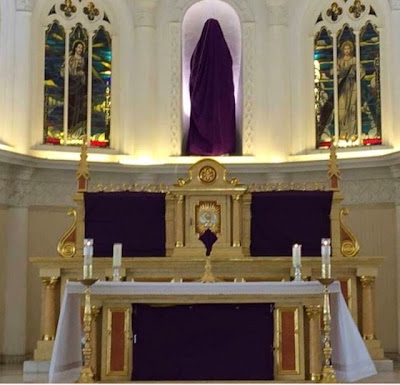Palm Sunday - Year B
We all love praises. Who is the world doesn't like praises from their friends, peers, boss, parents etc? Perhaps, we feel good when someone posted a whole long things of good comments on your Facebook status.
Now, let me ask you a question.
To be praised and exalted by men or to be glorified by God?
Which is more important? Today’s readings provides the answer. To be glorified by God – that is the most important goal of our lives. But in reality, the opposite is true. Most of us want to be praised. Most of us want to ‘save face’; we want to be liked by people around us. Most of us want to be popular. No one wants to be mocked or ridiculed. No one wants to be unpopular. No one wants to be rejected. We want to be seen as the “good guy”.
But the truth of the matter is this: if we want to follow Jesus, we can’t always be the “good guy”, we can’t always please everyone. If we want to follow Jesus we will not always be popular. When the prevalent culture in the workplace is dishonesty, you will be singled out and ostracized for your honesty. If you are sincerely honest in all your transactions, you would most probably lose a lot of business and will not advance very quickly in your career. If you refuse to cheat in your exams while your classmates are doing so, you most probably would not get grades as good as them. If you are a faithful follower of Christ, be prepared to receive insults and even opposition from others. Be ready to be labeled foolish by your own relatives and friends. Forget about trying to be popular.
This is the way which Jesus had taken. It is the Way of the Cross instead of the Way of Glory. It is the way of humility rather than the way of self-glory. It is the way of being last instead of being first. It is the way of losing everything for the kingdom of God rather than the way of gaining everything and yet losing our lives.
This is the way of Jesus as described in today’s second reading: “His state was divine, yet Christ Jesus did not cling to his equality with God but emptied himself to assume the condition of a slave, and became as men are, and being as all men are, he was humbler yet, even to accepting death, death on a cross.”
This too must be our fate if we wished to follow Jesus. If we ask the Lord for a disciple’s tongue as Isaiah did in the first reading, we must be prepared to receive all kinds of opposition and insult from others. To be a disciple of Jesus means that we would be treated like Jesus.
Having heard all this, you may feel discouraged. You may find it hard and even find it impossible to follow Jesus. Therefore, most of us are tempted to settle for a ‘soft’ version of Christianity, one which is insulated from the cross. According to Dietrich Bonhoeffer, a Lutheran minister and theologian who was executed by the Nazis for his refusal to subordinate the Church to the state machinery, “Cheap grace is the grace we bestow on ourselves. Cheap grace is the preaching of forgiveness without requiring repentance, baptism without church discipline, Communion without confession.... Cheap grace is grace without discipleship, grace without the cross, grace without Jesus Christ, living and incarnate.” The truth is, it isn’t easy following Jesus. Bonhoeffer reminds us: “Cheap grace is the deadly enemy of our Church. We are fighting today for costly grace.”
The palms which you carried at the beginning of the mass can also be found in Christian iconography – in the hands of countless of martyrs who willingly gave up their lives for their faith. Placed in their hands, the Church acknowledges that they paid the price of discipleship not just in words and nice plenitudes, but by their lives. This is the costly grace which Bonhoeffer wrote about and the cost all Christians must be prepared to pay if we wish to be true to the vision and mission which Christ has offered us. It is fitting testimony that in suffering and death, the martyrs found true glory in the eyes of God. Thus, our consolation is that the Lord will be our strength and our support. Isaiah assures us of this: “The Lord comes to my help, so that I am untouched by the insults.” We are also reassured by the promise of Jesus that if we share in his death, we will also share in his glory. In spite of the rejection and humiliation Jesus received from the hands of men, St. Paul in the second reading assures us that “God raised him high and gave him the name which is above all other names”. To be glorified by God is far greater and far more important than any insults or rejection we may receive from men. To receive the gift of eternal life is far more precious than holding on to the passing years we have in our earthly life.
As we begin Holy Week, let us follow Jesus as he enters Jerusalem. Let us remain faithful to him even when the going gets tough. Let us take up our crosses and follow him. We can do this because we know and we believe that at the end of our journey, we will receive the crown of glory from the hands of Jesus who gave his life for us on the cross. This is the crown paid for with the price of the blood of the Son of God – a costly grace indeed!







